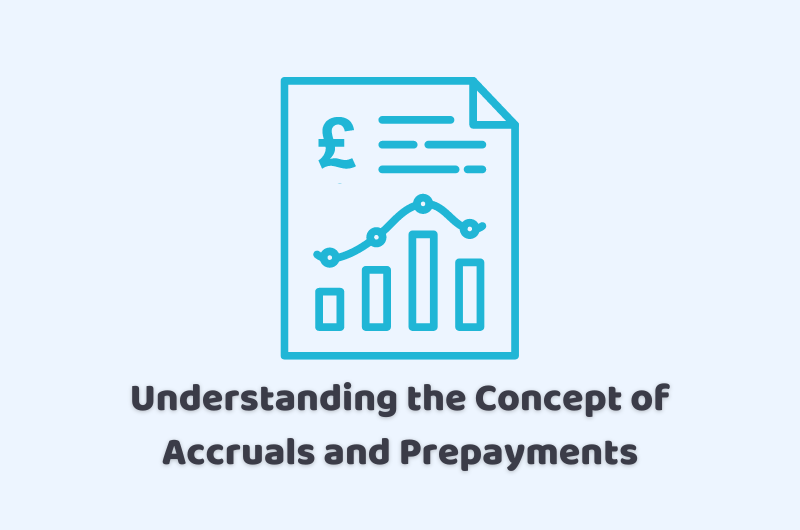
06/12/2023Accountants , Accountants for Contractors , Accounting
Let’s dive into the world of accruals and prepayments. These two concepts are fundamental in the realm of accounting and play a crucial role in accurately reflecting a company’s financial position and performance. Accruals and prepayments help address the timing and recognition of revenues and expenses, ensuring that they are properly recorded in the appropriate accounting periods. So, let’s explore the intricacies of accruals and prepayments further and uncover the importance they hold in the world of accounting!
Reach out to our smart and clever-minded guys to get an understanding of the tax set of rules in the UK queries answered quickly. We will help to understand your queries instantly.
How to Define the Concept of Accruals in Accounting?
Accruals are an essential concept in accounting that helps ensure accurate financial reporting. This allows for better decision-making and analysis of a company’s profitability and financial health. Accruals are an integral part of the UK accounting framework and are essential for producing reliable financial statements.
They ensure that revenues and expenses are recorded in the appropriate accounting period, providing a more accurate representation of a company’s financial performance. By understanding and properly applying the concept of accruals, businesses in the UK can maintain transparency, comply with accounting standards, and make informed financial decisions.
What is the Concept of Prepayments in Accounting?
Prepayments are an important aspect of financial reporting that ensures accurate recognition of expenses or revenues in the appropriate accounting periods. In the UK, prepayments refer to the advance payment or receipt of cash for goods or services that will be consumed or provided in future accounting periods.
When a prepayment occurs, it is initially recorded as an asset or a liability on the balance sheet, depending on whether it is a prepayment or a deferred income. This allows for the proper allocation of the expense or revenue over the periods to which it relates.
For instance, if a company pays rent for the upcoming year in advance, the amount paid is considered a prepayment. This prepayment is then gradually recognized as an expense over the year, reflecting the portion of the rent that relates to each accounting period.
Similarly, if a customer pays in advance for a service that will be provided over a specific period, the amount received is recorded as deferred income. As the service is rendered, the deferred income is gradually recognized as revenue, reflecting the portion of the service provided in each accounting period.
Prepayments are crucial in UK accounting as they ensure that expenses and revenues are appropriately matched with the periods to which they relate.
What is the Importance of its Role?
Prepayments are super important in accounting in the UK! They help ensure accurate recognition of expenses and revenues in the right accounting periods. This helps allocate the expense or revenue over the periods it relates to.
This prepayment is then recognized gradually as an expense over the year, matching the rent to the relevant accounting periods. Prepayments help maintain transparency, comply with accounting standards, and make informed financial decisions.
What are Common Examples of Prepayments?
Prepayments are a common occurrence in accounting, and several examples illustrate how they work. Let’s say a business pays for a year’s worth of insurance premiums upfront in January. This payment is considered a prepayment because the coverage extends over multiple accounting periods. The expense is then recognized gradually over the year, reflecting the portion of the insurance that corresponds to each period.
Another example is when a company pays for advertising or marketing services in advance. If a business pays for a six-month advertising campaign upfront, it’s considered a prepayment. The expense is recognized throughout the campaign, ensuring that it is properly allocated to the relevant accounting periods.
Why Do We Need Accruals and Prepayments?
Accruals and prepayments serve different purposes in accounting. Accruals are used to recognize revenues and expenses in the accounting period in which they are earned or incurred, regardless of when the cash is received or paid. This ensures that financial statements reflect the economic activities of a business accurately. On the other hand, prepayments are payments made in advance for goods or services that will be received or consumed in future accounting periods.
Prepayments are initially recorded as assets or liabilities on the balance sheet and are then gradually recognized as expenses or revenues over the periods to which they relate. In summary, accruals focus on matching revenues and expenses to the period in which they occur, while prepayments deal with the timing of cash flows and the allocation of expenses or revenues over multiple accounting periods. Both concepts are important in ensuring accurate financial reporting.
The Bottom Line
To sum up the discussion about accruals and prepayments, we can say that accruals help ensure that revenues and expenses are recognized in the appropriate accounting period, regardless of when the cash is received or paid. This allows for a more accurate representation of a company’s financial performance. On the other hand, prepayments address the timing of cash flows and the allocation of expenses or revenues over multiple accounting periods.
By recording prepayments as assets or liabilities and gradually recognising them as expenses or revenues, businesses can properly match their financial transactions to the periods in which they are relevant. Businesses need to understand and apply these concepts correctly to ensure transparency and compliance with accounting standards.
Our team of professional members loves to hear out your business problems and find out the possible and suitable solutions quickly to the reporting in the UK. Contact us now.
Disclaimer: The information about the tax on accruals and prepayments provided in this blog includes text and graphics of general nature. It does not intend to disregard any of the professional advice.

